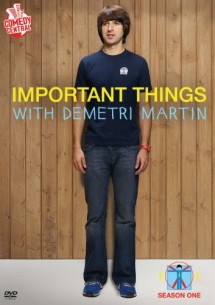It's a bit unusual for an actor to be able to promote starring in both an Ang Lee movie and a Comedy Central series, but that's what Demetri Martin can do this summer. The 36-year-old New Yorker is at home on the cable network, which has broadcast and rerun his stand-up comedy specials over the past few years and also featured him as Senior Youth Correspondent on "The Daily Show." Film is a different arena, one Martin boldly enters as the lead of the recently-released dramedy Taking Woodstock. YouTube clips of his deadpan act led Lee, the director of Brokeback Mountain and Crouching Tiger, Hidden Dragon, to cast Martin in the true story behind the landmark 1969 rock concert. It's not the logical next step,
but then neither was dropping out of law school (forfeiting a full scholarship at NYU) to become a "Daily Show" intern, something Martin did in 1996.
Choosing his newfound passion over stability, Martin eventually became a writer for "Late Night with Conan O'Brien" and went on to turn his stand-up work into television specials, CDs, and DVDs. Earlier this year, he got his own sketch show from the network that helped make him an icon. Now, with Taking Woodstock playing on the big screen, Comedy Central and parent company Paramount bring "Important Things with Demetri Martin": Season One to DVD.
Each episode of the show tackles an important thing (e.g. power, safety, timing), presumably covering topics on which Martin has already developed substantial stand-up material. That helps, because stand-up routines constitute the bulk of this series. Wearing a navy blue T-shirt and jeans, Martin trots out to a wooden set, where a small but supportive audience listens to his jokes. His nerdy persona is accessible and his brand of humor is observational. Those following the comedy world have compared Martin to Steven Wright and the late Mitch Hedberg, noticing the former's influence in delivery and the latter's similarity in subject matter.

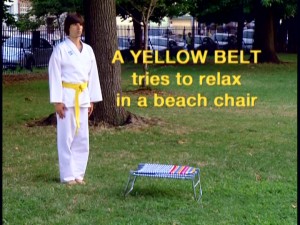
Recognizing that one man's stand-up comedy needs support to sustain a show, "Important Things" does offer different components to qualify it as a sketch/variety program. In remotely-filmed bits, Martin portrays a folk singer, a slam poet, a yellow belt using his karate skills on everyday tasks, the ancient philosopher Demetrocles, and the marginalized inventor Da Mici. Some segments work well, but none of this material ever really hits all its marks satisfactorily. A handful of commercial parodies also play more like a "Mad TV" sketch you shouldn't have given a chance than something you'd find in a "Best of 'Saturday Night Live'" compilation.
Other sketches don't easily fit into one of the recurring groups. These are the ones most likely to feature a recognizable guest star (or at least writer and handily the show's second most prominent performer,
H. Jon Benjamin) and more apt to contain clever ideas than something to stretch an already thin gag. That such segments stand out underscores how much the series succumbs to repetition and formula over a freer form. Still, not all of the repeated acts grow tired; singling out human behaviors as an episode's sponsors is reliably good for a laugh and the "Important Things Things" animated segments on clever yet inane products often amuse.
One of the show's bigger shortcomings is its use of a laugh track. Presumably coming from the real in-studio audience (necessary for the stand-up portions), the crowd reaction undercuts the humor, especially when applied to the pre-produced segments. The funny moments are more likely to elicit smiles than laughs, but even those are hard to grant when a subtle gesture gets the audience going like the wacky Sprouse brothers supposedly rev a "Suite Life" studio crowd.
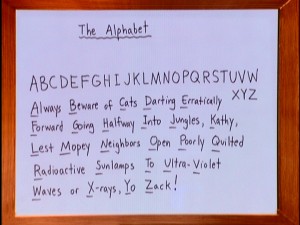
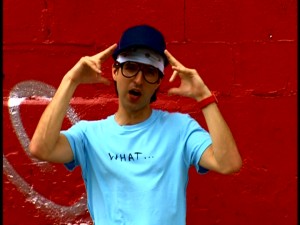
Despite a pretty mediocre success rate, "Important Things" isn't a completely unrewarding experience. Chuckles are to be had from the joy that the show takes in plainly labeling ordinary things. That the host controls the show with options on his "interactive" index cards is a witty concept. And Martin himself certainly proves to be moderately amusing here, especially when he is playing with words, charts, equations, metaphors, and simple drawings. But both he and the viewer had a more comfortable arrangement as quirky stand-up comedian and primed audience member. Without a crowd, excitement, a warm-up act and particularly strong off-stage skills, there just aren't many laughs to be had.
The DVD doesn't really clarify what it contains for non-viewers, nor does it explicitly convey that the series' language goes uncensored here. We get the infrequent use of four-letter words and variations here (surely bleeped on Comedy Central), but Martin's act is relatively tame and good-natured compared to other contemporary comedians.
Synopsizing a sketch show is never an easy task, but I've covered the most substantial parts of Season 1's seven episodes below, both to enable this review to stand as an episode guide and to give you an idea of the show's content.
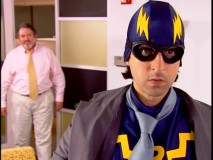
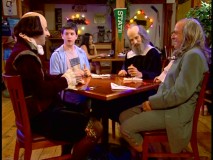
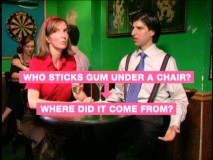
1. Timing (21:32) (Originally aired February 11, 2009)
Demetri demonstrates the importance of timing by turning large pad pages while playing multiple musical instruments. He also portrays a raver who's too early, has trouble acting across from Amanda Peet, and depicts a "Time Gigolo" who uses a time machine to sleep with historical women. Mock commercials lampoon De Beers ring ads.
2. Power (21:32) (Originally aired February 18, 2009)
A power struggle emerges when two drivers want the same parking space. Superhero The Revenger learns the truth about his father's death.
Demetri muses on how humans exert their power over animals. He sings the song "Me vs. You." And there is a long, distasteful faux advertisement for Creedocide, a way to combat rats with religious divides.
3. Brains (21:32) (Originally aired February 25, 2009)
A college applicant is joined by Shakespeare, Galileo, and Ben Franklin at a T.G.I. Friday's. Demetri shares brain usage data, mnemonic devices, and equations. The Prince (John Oliver) and the Pauper discuss switching back. We learn what happens to brains donated to science.
4. Chairs (21:32) (Originally aired March 4, 2009)
Demetri learns the importance of picking a seat at a social function. Another short plays out backwards to reveal where that gum under the seat came from. A cartoon shows us thrilling new amusement park rides. And two urinating workers gripe about their co-workers, who, unbeknownst to them, hear from the bathroom's stalls.
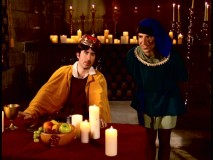

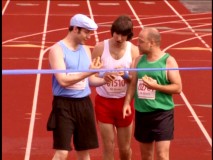
5. Safety (21:32) (Originally aired March 11, 2009)
We observe life for a guy in a neck brace. S & M couples grapple with difficult safe words. A home security system uses "pubes" for protection. A home for the elderly vows to put its past antics behind it. Also, there is a 13th century sex ed class and a royal food taster plans a royal poisoning.
6. Coolness (21:32) (Originally aired March 18, 2009)
Demetri theorizes about being cool, plays a man who needs help being cool on a date, and another man cool enough to get a dragon tattoo on his face. Dads of young ones attempt to be cool in the park. A new Important Things product helps women look cool while wearing a shower cap.
7. Games (21:32) (Originally aired March 25, 2009)
Demetri portrays an Emotional Escape Artist poised to dump his girlfriend, and a version of himself competing in a humorous passive aggressive race. Humans prank birds as payback for their nasty habits. A new way to play chess is advertised. And a tiny guy does a number of things.
VIDEO and AUDIO
"Important Things" isn't a show you watch for stunning visuals and a powerful soundtrack. So it's not too much of a downer that the DVD presents the episodes as they aired, in 1.33:1 fullscreen and basic Dolby Stereo sound. The picture quality varies from segment to segment and episode to episode, but it's generally presentable and presumably looking as intended. The soundtrack is adequate, not extraordinary. Surprising for a Comedy Central disc, there is an English subtitles track, but alas, it is sadly empty.


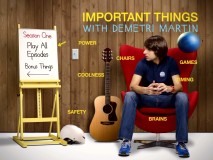
BONUS FEATURES, MENUS and PACKAGING
With three pages of bonus features menus, the DVD looks pretty loaded, but most of these listings are simply short deleted segments or outtakes (19:37 altogether). Among the cuts, Demetri discusses brain injuries, plays basketball, portrays a cult leader whose falling in love drastically changes the group suicide plan,
hits on a lady mannequin, and gives us unused "yellow belt" and "tiny guy" jokes. He also sings of ways to kill with kindness and, to the studio audience, amusingly apologizes for a delay and answers their questions. Outtakes come from the parking war and T.G.I.F.'s "dinner with heroes" sketches.
We also get a production graph connecting all the planned sketch characters as Martin had intended to and a production lineup chart showing how he hoped to fit actors into an episode despite budget constraints. Neither is especially interesting to navigate.
Finally, four episodes -- "Timing", "Power", "Coolness", and "Games" -- are accompanied by audio commentary recorded by Demetri Martin, head writer/supervising producer Michael Koman, and writer Dan Mintz. Mintz barely speaks, but the other two, especially Martin, prevent giving us dead air. Throughout the tracks, they shed light on the show, explaining how last-minute stand-up bits join sketches filmed far in advance. Other topics addressed include: why Martin always wears the same thing, the true story that inspired the dragon tattoo sketch, how the episode order came to be changed, the parking space sketch's unrealized similarity to a "Seinfeld" bit, shooting locations/experiences, unused ideas, and little editing anomalies they spot. If you really enjoy the show, then you probably won't regret devoting time to these easy-to-listen commentaries.
The deleted 3-minute "Cult Leader in Love" sketch is also joined by a Martin and Koman commentary.
From the second page of extras, I uncovered an Easter egg containing an unremarkable outtake from the Amanda Peet scene (0:36). I would guess other hidden features are also out there, but I had trouble even reaccessing the one I miraculously stumbled upon.
The DVD takes an offbeat approach to menus, with a short animated intro giving way to a static screen. The seven words scattered about pointing to items are the titles of episodes, which are preceded by a short Demetri Martin comment before being played. Menu transitions are accompanied by either Martin saying "transition" or making a sound effect.
"Important Things" arrives in a white keepcase, packaging usually reserved for family fare. Inside are a tiny sticker of the show's lightning man logo and a tiny poster of Martin (whose back graciously identifies it as such).
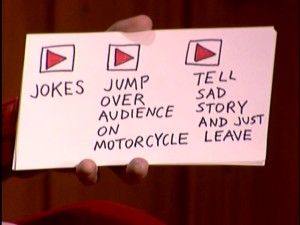
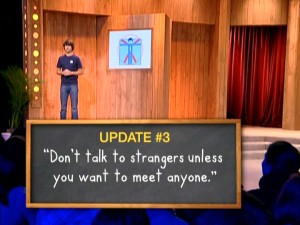
CLOSING THOUGHTS
From what I've seen, Demetri Martin is probably a creative stand-up comedian. But that talent doesn't translate very well to his sketch/variety series "Important Things", at least in its first season. There are some laughs, but not nearly as many as you'd hope for and the show expects. The strongest moments tend to be ones created in the stand-up setting and the few memorable sketches.
Comedy Central's DVD provides some decent bonus material and a passable presentation at a most reasonable list price. Like most stand-up comedy, there isn't much replay value here, but I'd still say this is worth seeing once, especially if you're already a Demetri Martin fan.
More on the DVD / Buy Amazon.com

